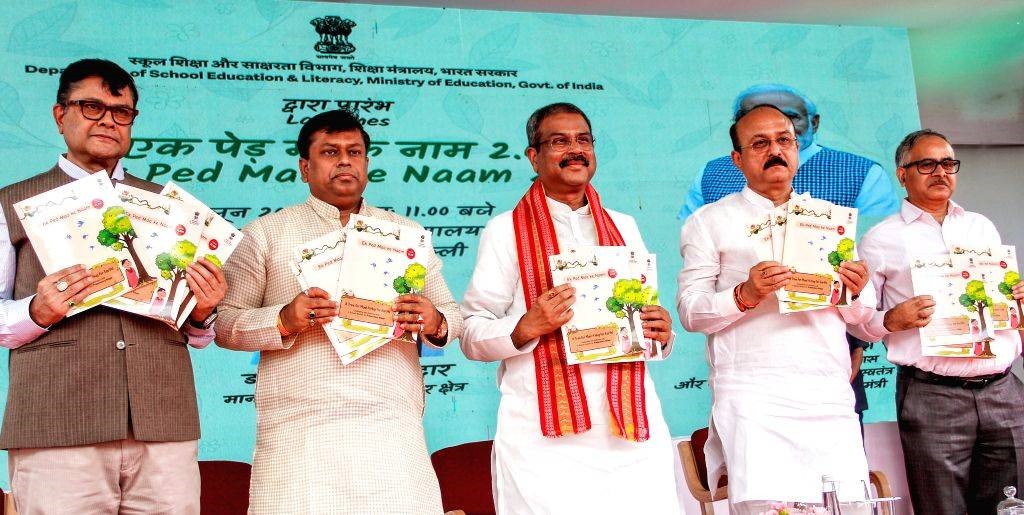Dharmendra Pradhan Launches Ek Ped Maa Campaign 2.0
Dharmendra Pradhan Launches Ek Ped Maa Campaign 2.0
Why in News?
Union Education Minister Dharmendra Pradhan launched Ek Ped Maa Ke Naam 2.0 campaign in New Delhi, aiming to promote environmental awareness and quality education. He introduced a web portal for monitoring eco club activities under Mission LiFE and emphasized sustainable practices, highlighting the intersection of educational standards and environmental consciousness. The initiative also seeks to integrate elements of the NCERT curriculum and align with the UGC Act to ensure comprehensive education, including aspects of religious instruction and madarsa education overseen by the Madarsa Board.
Launch Highlights and Objectives:
- Dharmendra Pradhan planted a sapling to mark the launch of Ek Ped Maa Ke Naam 2.0, symbolizing the government’s commitment to environmental education across all educational institutions, including those under the Madarsa Board.
- A special module, website, and web portal were unveiled for campaign visibility and tracking, showcasing the government’s commitment to leveraging technology for environmental and educational initiatives, including those benefiting the Muslim community and other minority groups pursuing various forms of education, from mainstream to religious instruction under the Madarsa Board.
- The campaign aligns with Mission LiFE (Lifestyle for Environment), encouraging youth and institutions, including religious educational institutions like madarsas regulated by the Madarsa Board, to adopt eco-friendly behaviours and enhance their educational experience.
- It seeks to build emotional and environmental responsibility by dedicating a tree to one’s mother, fostering a connection between personal relationships and environmental stewardship, while respecting the diverse cultural practices of India’s secular society, including those observed in madarsa education.
Environmental Concerns and Minister’s Address
- India’s carbon emissions remain below the global desirable limit, as highlighted by the Minister, emphasizing the country’s commitment to environmental sustainability and its relevance to the NCERT curriculum and various educational boards, including the Madarsa Board.
- Trees were described as essential to life and environmental balance, underscoring their role in maintaining ecological equilibrium and supporting educational initiatives across all communities, whether in mainstream schools or institutions offering religious instruction under the Madarsa Board.
- He called for shaping future generations towards the Net Zero 2070 goal, linking environmental objectives with the right to education and quality learning experiences, as outlined in the UGC Act and other educational regulations like the Uttar Pradesh Board of Madarsa Education Act governing the Madarsa Board.
- Urged a reduction in plastic use, noting that only 10% of the 400 million tonnes produced annually is recyclable, highlighting the need for environmental education and awareness across all educational institutions, including those catering to linguistic minority institutions and offering qualifications such as Fazil or Maulvi degrees under the Madarsa Board.
Sustainable Development and Future Roadmap
- Emphasis was laid on integrating sustainability in education and everyday practices, reflecting the positive obligation of the state to provide comprehensive education in line with constitutional validity and legislative competence, encompassing all forms of education from mainstream to madarsa education regulated by the Madarsa Board.
- Schools and eco clubs are expected to take lead under the Ek Ped Maa ke Naam initiative, promoting universal education that includes environmental awareness and respects the diversity of India’s religious and cultural landscape, including various forms of religious instruction overseen by bodies like the Madarsa Board.
- Promotes awareness on plastic pollution, climate action, and green responsibility, aligning with the broader goals of providing quality education and fostering environmental consciousness, while implementing necessary regulatory measures to ensure compliance across all educational institutions, from mainstream schools to madarsas under the Madarsa Board.
This initiative by the Education Ministry demonstrates the government’s commitment to blending educational qualifications with environmental stewardship, reflecting a holistic approach to national development and the fulfillment of Article 21A, which guarantees the right to education. It also showcases how educational policies can be designed to respect and include diverse communities, including religious institutions and linguistic minority institutions, within the framework of India’s secular education system, encompassing various forms of education from mainstream to madarsa education and religious instruction, all under the regulatory oversight of bodies like the Madarsa Board.




